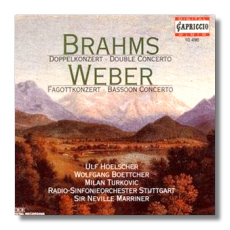
The Internet's Premier Classical Music Source
Related Links
-
Brahms Reviews
Weber Reviews - Latest Reviews
- More Reviews
-
By Composer
-
Collections
DVD & Blu-ray
Books
Concert Reviews
Articles/Interviews
Software
Audio
Search Amazon
Recommended Links
Site News
 CD Review
CD Review
Weber/Brahms

Bassoon/Double Concertos
- Carl Maria von Weber:
- Bassoon Concerto in F Major
- Andante e Rondo Ungarese for Basson & Orchestra
- Johannes Brahms: "Double" Concerto for Violin & Cello Op. 102 (1887)
Milan Turkovic, bassoon
Ulf Hoelscher, violin
Wolfgang Boettcher, cello
Radio-Sinfonieorchester Stuttgart/Neville Marriner
Capriccio 10496 1993 DDD 61:05
Beethoven's contemporary, Carl Maria von Weber, actually arrived at the terminus toward which Beethoven strove so mightily throughout his stormy lifetime. In the Wolf Glen Scene from Der Freischütz, Weber himself forged a magic bullet, practically defining German misterioso in a single stroke. His Konzertstück for piano and orchestra, based on a medieval program, is a founding document of musical romanticism. The bassoon concerto is cut from the same melodic and harmonic cloth, but it offers no literary clues to illuminate its musical meaning. In fact, it doesn't need any, for Weber understood the bassoon – and the concerto – supremely well. He keeps the soloist in the spotlight for almost the entire work without ever lapsing into the kind of vapid passagework that clutters the concertos of second-rate composers. Strangely, the same idiomatic understanding of the bassoon and perfect balance between solo and orchestra characterize the Andante and "Rondo Ungarese," even though that work was not originally conceieved for bassoon.
Milan Turkovic and Sir Neville Marriner present these works in exuberantly athletic performances, beautifully recorded. Turkovic plays Weber sweetly, with abundant nuance and stunning virtuoso passagework as required. What a role for the bassoon, and what an actor for the role!
Brahms' concerto for violin and cello is often characterized as a time traveler: a concerto grosso transplanted two centuries after the form's golden era. This stepchild seems to be rising in popularity, after a period of unfavorable comparisons with the violin concerto. It was not always so disparaged. Brahms sought the advice of his violinist friend, Joseph Joachim, in shaping the violin part. Later, Joachim's biographer, Andreas Moser, rendered what came to be an infamous opinion that the double concerto was a greater work than the violin concerto. The two are, at least, very different. The double concerto is leaner, more muscular, and more straightforward. Its jagged, angular themes are as bracing as fragments from a Stravinsky ballet, yet its tuttis rise to majestic aeries as on eagles' wings.
Violinist Ulf Hoelscher, familiar mostly from recordings of fringe repertoire (Korngold, Spohr), and cellist Wolfgang Boettcher turn out to be ideal soloists, and Sir Neville Marriner and his orchestra bring a sweep to the orchestral accompaniment that ushers this recording into the charmed circle. Compare Heifetz and Piatigorsky or Stern and Rose: those soloists play solos, seldom chamber music. Perhaps there's something to the concerto grosso interpretation of this work after all. In such a genre, ensemble is foremost. The ensemble here is superb, in the rhythmic passages of the first movement, in the lush passages of the second, and in the virtuoso passages of the third. As you might expect from the bibilical rule that he who humbles himself shall be exalted – which is the golden rule of chamber music as well – the soloists shine all the more brightly for their faithfulness to the composer's intent. The performance is exceptionally rich in detail as well, for neither the conductor nor the soloists have lost sight of the trees in their panoramic view of the forest.
The coupling of concertos for bassoon and strings by composers as diverse as Weber and Brahms is unusual, but the quality of the music and performances is so high and the engineering is so perfectly balanced and revelatory that any one of the three works would be worth the price of the disc. Contrary to the proverb, good things don't always come in threes. But here, all in one, are three things that could hardly be better. Most highly recommended.
Copyright © 1996, Robert Maxham


















